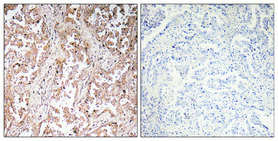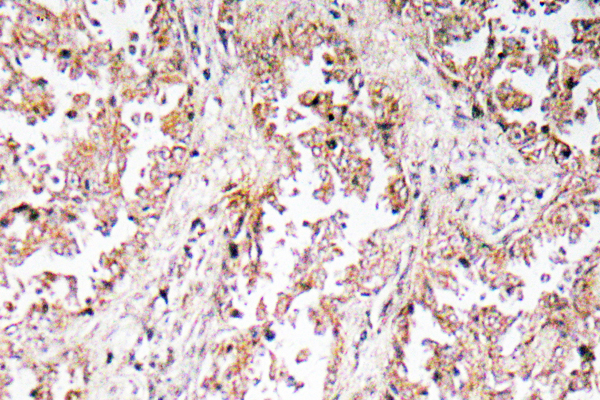UCP2 Polyclonal Antibody
- Catalog No.:YT4813
- Applications:WB;IHC;IF;ELISA
- Reactivity:Human;Mouse;Rat
- Target:
- UCP2
- Gene Name:
- UCP2
- Protein Name:
- Mitochondrial uncoupling protein 2
- Human Gene Id:
- 7351
- Human Swiss Prot No:
- P55851
- Mouse Gene Id:
- 22228
- Mouse Swiss Prot No:
- P70406
- Rat Gene Id:
- 54315
- Rat Swiss Prot No:
- P56500
- Immunogen:
- The antiserum was produced against synthesized peptide derived from human UCP2. AA range:64-113
- Specificity:
- UCP2 Polyclonal Antibody detects endogenous levels of UCP2 protein.
- Formulation:
- Liquid in PBS containing 50% glycerol, 0.5% BSA and 0.02% sodium azide.
- Source:
- Polyclonal, Rabbit,IgG
- Dilution:
- WB 1:500-2000 IHC 1:100 - 1:300. ELISA: 1:10000. IF 1:50-200
- Purification:
- The antibody was affinity-purified from rabbit antiserum by affinity-chromatography using epitope-specific immunogen.
- Concentration:
- 1 mg/ml
- Storage Stability:
- -15°C to -25°C/1 year(Do not lower than -25°C)
- Other Name:
- UCP2;SLC25A8;Mitochondrial uncoupling protein 2;UCP 2;Solute carrier family 25 member 8;UCPH
- Molecular Weight(Da):
- 33kD
- Background:
- Mitochondrial uncoupling proteins (UCP) are members of the larger family of mitochondrial anion carrier proteins (MACP). UCPs separate oxidative phosphorylation from ATP synthesis with energy dissipated as heat, also referred to as the mitochondrial proton leak. UCPs facilitate the transfer of anions from the inner to the outer mitochondrial membrane and the return transfer of protons from the outer to the inner mitochondrial membrane. They also reduce the mitochondrial membrane potential in mammalian cells. Tissue specificity occurs for the different UCPs and the exact methods of how UCPs transfer H+/OH- are not known. UCPs contain the three homologous protein domains of MACPs. This gene is expressed in many tissues, with the greatest expression in skeletal muscle. It is thought to play a role in nonshivering thermogenesis, obesity and diabetes. Chromosomal order is 5'-UCP3-UCP2-3'. [prov
- Function:
- function:UCP are mitochondrial transporter proteins that create proton leaks across the inner mitochondrial membrane, thus uncoupling oxidative phosphorylation from ATP synthesis. As a result, energy is dissipated in the form of heat.,polymorphism:Genetic variation in UCP2 influences susceptibility to obesity [MIM:607447]; also called body mass index quantitative trait locus type 4 (BMIQ4). Obesity is the most common nutritional disorder in Western society.,similarity:Belongs to the mitochondrial carrier family.,similarity:Contains 3 Solcar repeats.,subunit:Acts as a dimer forming a proton channel.,tissue specificity:Widely expressed in adult human tissues, including tissues rich in macrophages. Most expressed in white adipose tissue and skeletal muscle.,
- Subcellular Location:
- Mitochondrion inner membrane; Multi-pass membrane protein.
- Expression:
- Widely expressed in adult human tissues, including tissues rich in macrophages. Most expressed in white adipose tissue and skeletal muscle.
Identification and Verification of Hub Mitochondrial Dysfunction Genes in Osteoarthritis Based on Bioinformatics Analysis Journal of Immunology Research Hui Niu WB Human 1:1000 Chondrocytes
- June 19-2018
- WESTERN IMMUNOBLOTTING PROTOCOL
- June 19-2018
- IMMUNOHISTOCHEMISTRY-PARAFFIN PROTOCOL
- June 19-2018
- IMMUNOFLUORESCENCE PROTOCOL
- September 08-2020
- FLOW-CYTOMEYRT-PROTOCOL
- May 20-2022
- Cell-Based ELISA│解您多样本WB检测之困扰
- July 13-2018
- CELL-BASED-ELISA-PROTOCOL-FOR-ACETYL-PROTEIN
- July 13-2018
- CELL-BASED-ELISA-PROTOCOL-FOR-PHOSPHO-PROTEIN
- July 13-2018
- Antibody-FAQs
- Products Images

- Immunohistochemical analysis of paraffin-embedded Human lung cancer. Antibody was diluted at 1:100(4° overnight). High-pressure and temperature Tris-EDTA,pH8.0 was used for antigen retrieval. Negetive contrl (right) obtaned from antibody was pre-absorbed by immunogen peptide.

- Immunohistochemistry analysis of UCP2 antibody in paraffin-embedded human lung carcinoma tissue.



